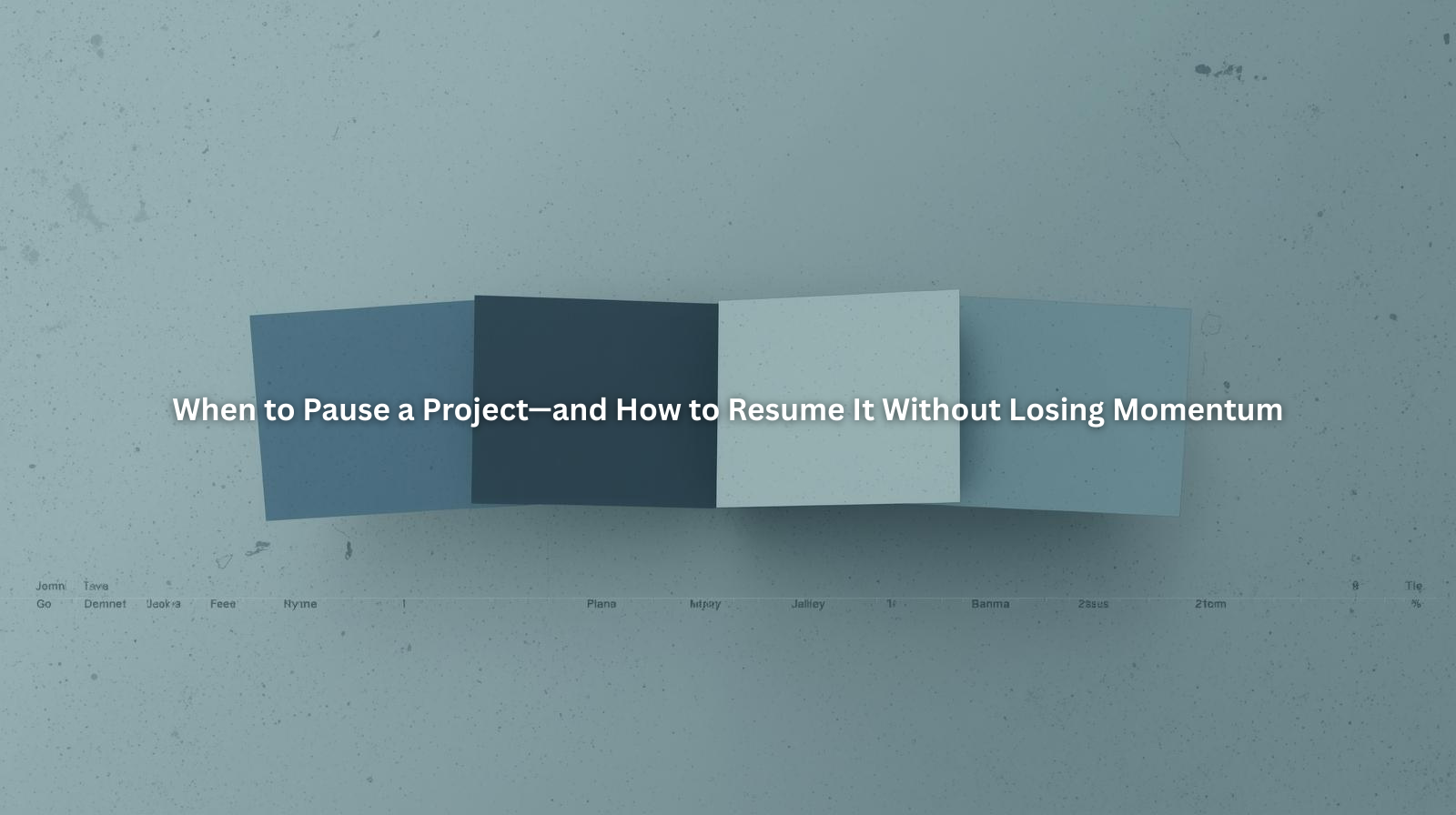When to Break the News: How to Communicate Delays Like a Pro

Table of Contents
- The Truth About Delays: Why They’re More Common Than You Think
- Why Freelancers Hesitate to Speak Up
- When (and Why) You Need to Break the News Early
- What to Say (And How to Say It)
- How to Rebuild the Timeline Without Losing Trust
- How ProjectBook.co Helps Prevent and Manage Delays
- FAQ: Navigating Project Delays as a Freelancer
1. The Truth About Delays: Why They’re More Common Than You Think
Even the best-planned freelance projects run into delays. Life happens. A client doesn’t respond. You get sick. A deliverable takes longer than expected. Or a last-minute revision creates more ripple effects than anticipated.
Delays aren’t necessarily a sign of disorganization or failure—they’re a sign that we’re working in real-time, with real people, and imperfect information. What separates professionals from amateurs isn’t whether delays happen. It’s how we respond when they do.

2. Why Freelancers Hesitate to Speak Up
Most freelancers don’t struggle with delays because they’re lazy or careless—they struggle with communicating them.
There’s a fear that speaking up will make you look unreliable, lose client trust, or even risk future work. So instead, many people stay silent, hoping to catch up or “fix it before the client notices.”
But the longer you wait, the harder it gets. The anxiety builds. The pressure grows. And often, the client finds out anyway—just in a way that feels worse for everyone involved.
Delays handled poorly erode trust. But delays handled professionally can actually build it.
3. When (and Why) You Need to Break the News Early
The moment you know something might be late—even if you’re not 100% sure yet—that’s your cue to say something.
Early communication gives your client time to adjust expectations. It shows you’re in control, even if the timeline isn’t perfect. And it positions you as someone who’s accountable and trustworthy—traits every client values more than robotic perfection.
Clients can forgive delays. What they don’t forgive is confusion, silence, or feeling like they were left out of the loop.
Think of breaking the news early as leadership, not damage control.
4. What to Say (And How to Say It)
You don’t need a long explanation. You just need to be clear, calm, and focused on next steps. Here’s a simple structure that works:
1. Acknowledge the shift
Let them know the project timeline needs to adjust.
“I wanted to give you a heads-up that we’ll need to shift the delivery date slightly.”
2. Share the reason briefly (without oversharing)
You don’t need to justify everything—just offer context.
“The revisions are taking a bit longer than expected,” or “There was a delay waiting on assets, and I want to make sure I deliver the quality we agreed on.”
3. Offer a new plan
This is key. Don’t just say “it’s delayed.” Say what’s happening instead.
“I’ll be sending the updated draft by next Thursday. That still gives us time for one full review before your launch date.”
4. Express appreciation and presence
End on a note of partnership and professionalism.
“Thanks for your flexibility—I’ll keep you updated every step of the way.”
5. How to Rebuild the Timeline Without Losing Trust
If the delay affects more than one deliverable or milestone, go beyond a single message. Consider sending a short, updated timeline or summary.
Here’s what to include:
- The new delivery date(s)
- What’s still on track
- What’s shifting (and why)
- Any new client action needed (approvals, feedback, etc.)
- Your plan for keeping things moving
Clients love seeing that you’re not just apologizing—you’re adapting. That makes them feel safe and respected, even if the project isn’t on its original path.
And if this delay affects their launch, campaign, or internal deadlines, give them options. Can you deliver a partial piece earlier? Can you adjust scope temporarily? Small accommodations like these show you’re solution-oriented—not avoidant.
6. How ProjectBook.co Helps Prevent and Manage Delays
The best way to manage delays is to prevent them where you can—and plan for them where you can’t.
ProjectBook.co is built to help freelancers stay one step ahead, with tools that give you visibility into your timeline, deadlines, and dependencies.
You can:
- Break projects into clear phases and tasks
- Flag priority items and see what’s blocked
- Communicate inside the project (so nothing gets lost in email)
- Adjust delivery dates with context—so everyone stays on the same page
- Set reminders to follow up, even during busy weeks
If a delay does happen, you’re not scrambling to figure out what’s affected—you already know. And that makes communicating with your clients a lot less stressful.

7. FAQ: Navigating Project Delays as a Freelancer
Should I apologize when I’m late?
A brief, sincere acknowledgment is helpful—but avoid over-apologizing. Focus on solutions and staying proactive.
How much detail should I share about why I’m delayed?
Keep it honest but simple. You don’t need to overshare personal details—just provide enough context to show you’re taking it seriously.
What if the delay was the client’s fault (late feedback, etc.)?
Still stay calm and kind. Acknowledge the delay, note the impact on the timeline, and suggest next steps. Most clients don’t mind the reminder—they just want clarity.
What if I’m consistently falling behind?
That’s a sign to re-evaluate your workload, pricing, or planning process. ProjectBook can help you see where things are slipping and adjust your systems.
Final Word
Delays happen. That’s not the problem.
The problem is staying silent, spiraling in stress, or hoping it’ll fix itself. The solution? Clear communication, calm updates, and a new plan your client can trust.
When you speak up early and handle delays like a pro, you don’t lose credibility—you earn it.
And with tools like ProjectBook.co by your side, it becomes a lot easier to manage timelines, communicate changes, and stay grounded—even when things don’t go perfectly.
So the next time something shifts? Don’t hide. Lead.


